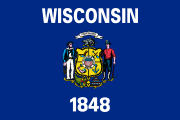1848
2008/9 Schools Wikipedia Selection. Related subjects: Years
| Centuries: | 18th century - 19th century - 20th century |
| Decades: | 1810s 1820s 1830s - 1840s - 1850s 1860s 1870s |
| Years: | 1845 1846 1847 - 1848 - 1849 1850 1851 |
Year 1848 (MDCCCXLVIII) was a leap year starting on Saturday (link will display the full calendar) of the Gregorian Calendar (or a leap year starting on Thursday of the 12-day slower Julian calendar).
1848 is historically famous for the wave of revolutions that swept Europe and the world, starting in France. They significantly altered the political and philosophical landscape and had major ramifications throughout the rest of the century.
Events of 1848
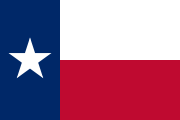
February 2: The Treaty of Guadalupe Hidalgo is signed, ending the Mexican–American War and ceding all the Republic of Texas's territorial claims to the United States for $15m.
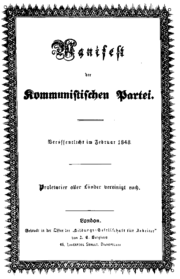
February 21: Karl Marx publishes The Communist Manifesto.

April 10: "Monster Rally" of Chartists held on Kennington Common in London; the first photograph of a crowd depicts it.
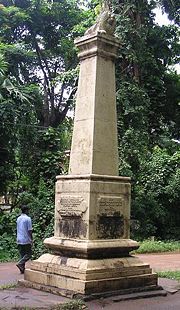
July 26: Matale Rebellion begins in Sri Lanka.

September 12: The Swiss Confederation reconstitutes itself as a federal republic.
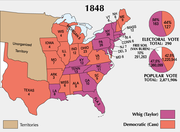
November 7: The first US presidential election held in every state on the same day sees Whig Zachary Taylor of Virginia defeat Democrat Lewis Cass of Michigan.
January - March
- January 3 - Joseph Jenkins Roberts is sworn in as the first president of the independent African Republic of Liberia.
- January 12 - The Palermo rising in Sicily, against the Bourbon kingdom of the Two Sicilies.
- January 24 - California Gold Rush: James W. Marshall finds gold at Sutter's Mill, in Coloma, California.
- January 31 - The Washington Monument is established.
- February 2 - Mexican–American War: The Treaty of Guadalupe Hidalgo is signed, ending the war and ceding to the United States virtually all of what is today the southwest of that country.
- February 8 - Revolution in Rome leads to the foundation of the second Roman Republic, soon to be led by Giuseppe Mazzini, though it would last only four months.
- February 21 - Karl Marx and Friedrich Engels publish The Communist Manifesto.
- February 22 - In Paris, revolt erupts against the king Louis Philippe. Two days later he abdicates, leading to the Second Republic.
- March 4 - Carlo Alberto di Savoia signs the Statuto Albertino that will represent the first constitution of the Kingdom of Sardinia and later of unified Italy.
- March 7 - The Great Mahele (land division) is signed in Hawaii.
- March 10 - The Treaty of Guadalupe Hidalgo, ending the Mexican-American War, is ratified by the United States Senate. (cf. February 2, above.)
- March 11 - Louis-Hippolyte Lafontaine and Robert Baldwin become the first Prime Ministers of the Province of Canada to be democratically elected under a system of responsible government.
- March 15 - Revolution breaks out in Hungary. The Habsburg rulers are compelled to meet the demands of the Reform Party.
- March 18- 19, Marsoroligheterna, in Stockholm, Sweden. Demonstrations outside the Royal Castle, where revolutionaries demands reforms, among them that Sweden becomes a republic. The Swedish king, Oscar I gives the guards order to shoot at the demonstrators.
- March 20 - King Ludwig I of Bavaria abdicates.
- March 23 - Province of Otago in New Zealand is founded.
April - June
- April 10
- Chartist 'Monster Rally' held in Kennington Park London, headed by Feargus O'Connor. A petition demanding the franchise is presented to parliament.
- A bridge collapses in Great Yarmouth, England, leaving 250 dead.
- May 1 - Phi Gamma Delta founded at Washington & Jefferson College.
- May 15 - Radicals invade the French Chamber of deputies.
- May 18 - Opening of the first German National Assembly ( Nationalversammlung) in Frankfurt, Germany.
- May 19 - The Treaty of Guadalupe Hidalgo, ending the Mexican-American War, is ratified by the Mexican government. (cf. February 2, above.)
- May 29 - Wisconsin is admitted as the 30th U.S. state.
July - September
- July 19 - Women's rights: Seneca Falls Convention - The two day Women's Rights Convention opens in Seneca Falls, New York and the " Bloomers" are introduced at the feminist convention.
- July 26 - Matale Rebellion against British rule in Sri Lanka.
- July 29 - Irish Potato Famine: Tipperary Revolt - In Tipperary, an unsuccessful nationalist revolt against British rule is put-down by a government police force.
- August 17 - Yucatán officially united with Mexico.
- August 19 - California Gold Rush: The New York Herald breaks the news to the East Coast of the United States that there is a gold rush in California (although the rush started in January).
- August 28 - Mathieu Luis becomes the first black member to join the French parliament as a representative of Guadaloupe.
- September 12 - One of the successes of the Revolutions of 1848, the Swiss Federal Constitution, patterned on the US Constitution, enters into force, creating a federal republic and one of the first modern democratic states in Europe.
- September 13 - One Phineas Gage of the Vermont Burlington Railroad astounds medical professionals by accidentally driving a 3-foot rail spike through his head, but still remained alive and apparently unharmed.
October - December
- October 28 - In Catalonia, Spain, inauguration of the Barcelona- Mataró railroad route, the first to be constructed in all the Iberian Peninsula.
- November 1 - In Boston, Massachusetts, the first medical school for women, The Boston Female Medical School (which later merged with Boston University School of Medicine), opens.
- November 3 - Greatly revised Dutch constitution proclaimed.
- November 4 - France ratifies a new constitution. The Second Republic of France is set up, ending the state of temporary government lasting since the Revolution of 1848.
- November 7 - U.S. presidential election, 1848: Whig Zachary Taylor of Louisiana defeats Democrat Lewis Cass of Michigan in the first US presidential election held in every state on the same day.
- December 2 - Ferdinand I, Emperor of Austria, abdicates in favour of his nephew, Franz Josef I.
- December 10 - Prince Louis-Napoleon Bonaparte elected first president of the French Second Republic.
- December 18 - Founding of Punta Arenas, the first mayor settlement in the Strait of Magellan.
- December 20 - President Bonaparte takes his Oath of Office in front of the French National Assembly.
- December 26 - Phi Delta Theta Fraternity was founded.
Undated
- The Revolutions of 1848, a series of widespread but mostly failed struggles for more liberal governments, from Brazil to Hungary.
- Cholera epidemic in New York kills 5000.
- Associated Press founded in New York.
- Queen's College for women founded in London.
- Boston Public Library is founded by an act of the Great and General Court of Massachusetts.
- Shaker song Simple Gifts is written by Joseph Brackett in Alfred, Maine.
- First railway in Spain is opened, with line Barcelona to Mataró (circa 40 km).
- Illinois and Michigan Canal is completed.
- Independent Republic of Yucatán joins Mexico in exchange for Mexican help in suppressing revolt by the indigenous Maya population.
- John Bird Sumner becomes archbishop of Canterbury.
- British, Dutch, and German governments lay claim to New Guinea.
- Admiral Nevelskoi explores Strait of Tartary.
- Dunedin, New Zealand is founded by Scots settlers.
- University of Ottawa is founded.
- University of Mississippi is founded.
- University of Wisconsin-Madison is founded.
- Geneva College in Pennsylvania is founded.
- Elizabeth Gaskell publishes Mary Barton anonymously.
- Richard Wagner begins writing libretto that will become Der Ring des Nibelungen (The Ring of the Nibelung).
- Rhodes College is founded.
Ongoing events
- Mexican-American War (1846-1848)
- Irish Potato Famine (1845-1849)
Births
| Gregorian calendar | 1848 MDCCCXLVIII |
| Ab urbe condita | 2601 |
| Armenian calendar | 1297 ԹՎ ՌՄՂԷ |
| Bahá'í calendar | 4 – 5 |
| Berber calendar | 2798 |
| Buddhist calendar | 2392 |
| Burmese calendar | 1210 |
| Chinese calendar | 4484/4544-11-25 ( 丁未年十一月廿五日) — to — 4485/4545-12-6( 戊申年十二月初六日) |
| Coptic calendar | 1564 – 1565 |
| Ethiopian calendar | 1840 – 1841 |
| Hebrew calendar | 5608 – 5609 |
| Hindu calendars | |
| - Vikram Samvat | 1903 – 1904 |
| - Shaka Samvat | 1770 – 1771 |
| - Kali Yuga | 4949 – 4950 |
| Holocene calendar | 11848 |
| Iranian calendar | 1226 – 1227 |
| Islamic calendar | 1264 – 1265 |
| Japanese calendar | Kōka 5 Kaei 1 (嘉永元年) |
| Korean calendar | 4181 |
| Thai solar calendar | 2391 |
January - June
- January 6 - Hristo Botev, Bulgarian revolutionary (d. 1876)
- January 19 - John F. Stairs, Canadian businessman and statesman (d. 1904)
- January 21 - Henri Duparc, French composer (d. 1933)
- January 27 - Togo Heihachiro, Japanese admiral (d. 1934)
- February 5
- February 8 - Joel Chandler Harris, American journalist and author (d. 1908)
- February 14 - Benjamin Baillaud, French astronomer (d. 1934)
- February 16 - Octave Mirbeau, French art critic and novelist (d. 1917)
- February 18 - Louis Comfort Tiffany, American glass artist (d. 1933)
- February 24
- February 27 - Hubert Parry, English composer (d. 1918)
- March 19 - Wyatt Earp, American lawman and gunfighter (d. 1929)
- March 31 - Viscount William Astor, British financier and statesman (d. 1919)
- April 7 - Randall Thomas Davidson, Archbishop of Canterbury (d. 1930)
- April 10 - Hubertine Auclert, French feminist (d. 1914)
- May 23 - Otto Lilienthal, German engineer (d. 1896)
- June 7 - Paul Gauguin, French artist (d. 1903)
July - December
- July 6 - Gabor Baross, Hungarian statesman (d. 1892)
- July 9 - Robert I, Duke of Parma, last ruling Duke of Parma (d. 1907)
- July 15 - Vilfredo Pareto, Italian economist (d. 1923)
- July 22
- July 25
- George Robert Aberigh-Mackay, Anglo-Indian writer (d. 1881)
- Arthur James Balfour, Prime Minister of the United Kingdom (d. 1930)
- September 4 - Lewis Howard Latimer, coinventor of the light bulb and telephone (d. 1928)
- October 3 - Henry Lerolle, French painter (d. 1929)
- November 8 - Gottlob Frege, German logician (d. 1925)
- November 12 - Eduard Müller, member of the Swiss Federal Council (d. 1919)
- November 13 - Albert I, Prince of Monaco (d. 1922)
- November 28 - Henry Lomb, German-American optician who co-founded Bausch & Lomb (d. 1908)
- December 6 - Johann Palisa, Austrian astronomer (d. 1925)
Deaths
January - June
- January 19 - Isaac D'Israeli, English author (b. 1766)
- January 20 - Christian VIII, King of Denmark (b. 1786)
- February 15 - Hermann von Boyen, Prussian field marshal (b. 1771)
- February 23 - John Quincy Adams, 6th President of the United States (b. 1767)
- March 29 - John Jacob Astor, American businessman (b. 1763)
- April 8 - Gaetano Donizetti, Italian composer (b. 1797)
- May 25 - Annette von Droste-Hülshoff, German writer (b. 1797)
- June 27 - Denis Auguste Affre, Archbishop of Paris (b. 1793)
July - December
- July 4 - François-René de Chateaubriand, French writer and diplomat (b. 1768)
- August 3 - Edward Baines, British newspaperman and politician (b. 1774)
- August 7 - Jöns Jakob Berzelius, Swedish chemist (b. 1779)
- August 12 - George Stephenson, English locomotive pioneer (b. 1781)
- August 30 - Simon Willard, celebrated American horologist (b. 1753)
- September 24 - Branwell Brontë, painter and poet, brother of novelists Charlotte, Emily and Anne (b. 1817)
- November 9 - Robert Blum, German politician (b. 1810)
- November 10 - Ibrahim Pasha of Egypt, military leader (b. 1789)
- November 23 - Sir John Barrow, English statesman (b. 1764)
- November 24 - William Lamb, 2nd Viscount Melbourne, Prime Minister of the United Kingdom (b. 1779)
- December 1 - Kyokutei Bakin, Japanese author (b. 1767)
- December 19 - Emily Brontë, English author (b. 1818)
